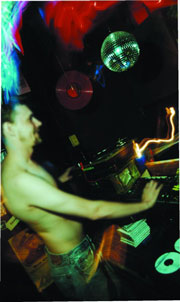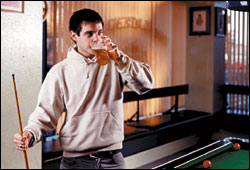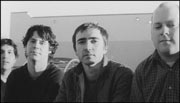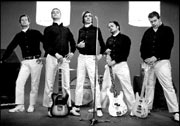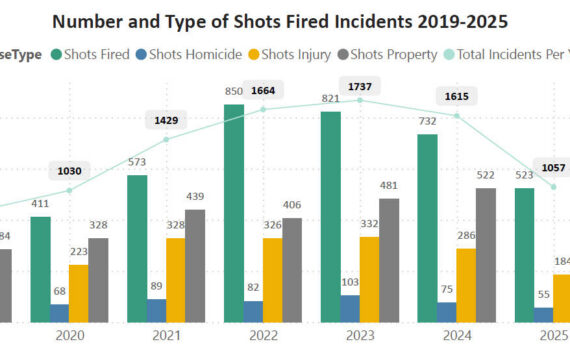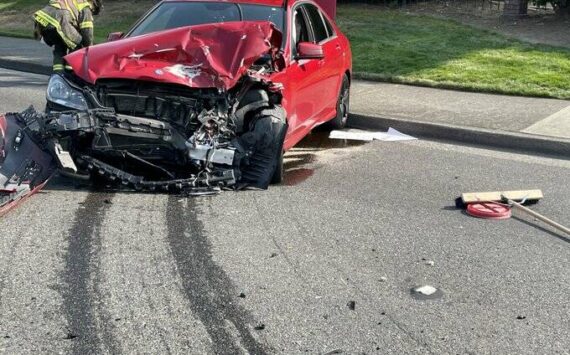With so much talk of male homosexuality focusing on who’s putting what into which hole, some of the most important bodily orifices of all are far too often neglected: the ears. It is generally accepted that a certain kind of music is as much a part of gay culture as, say, jazz, soul, or hip-hop is of black culture; but is this assumption valid? To some, Junior Vasquez and his circuit-boy ilk are an integral, valuable element of the gay community; to others, they are yet another marketing tool—one used just as cannily as lite beer, rainbow stickers, and “I’m Not Gay, But My Boyfriend Is” T-shirts to establish a lifestyle identified more by its material signifiers than its substance. We asked a number of same-sex-shtupping men working in the local music industry to talk about the music scene in Seattle, and how it relates (or doesn’t) to their sexuality and gay club culture in general. (P.S. If you’re wondering where the girls are, lesbians will get their moment in an article still to come.)
Tom Monday is currently the advertising and marketing director for alt-country magazine No Depression.
Music has an amazing power to bring people together and remind us that we’re all more alike than unalike. But when you make “gay music” or call yourself a “gay artist,” you tend to exclude people, which I think is sad. I might not want to debate same-sex marriage with my dad, but I can put on some Bill Monroe or Waylon Jennings and we can share our appreciation of that music, which is a sweet and honest bond.
I’m not trying to knock bands or artists who have a gay following. I understand why gay people are attracted to artists who aren’t afraid to be openly gay or let their gayness influence their work; some gay people need the affirmation that if so-and-so’s gay, then it must be OK. I’d rather sit in a bar and drink beer with Johnny Paycheck than go clubbing with Junior Vasquez, so that may put me at odds with the gay community.
It’s kind of ironic, because the gay community isn’t very diverse, despite all the lip service it gives to diversity and acceptance. I don’t really go to gay bars because I usually hate the music, and I never need to hear “It’s Raining Men” again in my life. I feel more kinship with people in the music community. There are a lot of great gay people in this town’s music community, so there’s sort of a gay community within the music scene here, which is cool. If that weren’t the case, I might feel like a total misfit.
Kurt B. Reighley is a Seattle Weekly columnist, local DJ, author of Searching for the Perfect Beat, and former editor for the Web site Wall of Sound.
I’m much more likely to spy a guy I fancy at Linda’s, the Baltic Room, or Hattie’s Hat [than gay bars], because the patrons at joints like that would seem to share more of my interests (a cold pint, vintage clothes, and sounds outside the realms of Destiny’s Child and the new Boy George mix CD).
The only designated gay bar I spend any amount of time at on a regular basis
is the Eagle, which is a godsend for a music lover like myself. I’m guaranteed that I can walk in on any weekday night and hear music that I enjoy, that perhaps I’ve never heard before (Eugene was playing Mahavishnu Orchestra the other night, ferchrissake). Once in a great while, I’ll give R Place, Changes (in Wallingford), or the Cuff a shot, but inevitably the girlie Hi-NRG/trance crap drives me out pretty quickly. I find this especially odd at the Cuff. I mean, it’s supposed to be a leather bar, right? So why are they always playing the umpteenth Madonna remix? Not very butch.
What I really miss is the original ARO.space. It was gay-owned and operated and had a unique aesthetic that appealed to my inner Design Queen but was still welcoming to my straight friends. Nobody makes me feel unwelcome at Al’s Tavern or the Tractor, so why should I be nervous about bringing a woman into Manray? The other thing I miss a lot is Pho Bang [the punk rock drag queen shows at Foxes]. It had a great mix of patrons, plus it was a treat to get to go out every Thursday and see a great band, cruise some punk-rock boys, and enjoy cocktails so strong they bordered on toxic. And the drag queens were doing something other than lip-synching Celine Dion!
Riz Rollins co-hosts a weekly radio show every Wednesday and Thursday night on KEXP and curates their Expansions program on Saturday and Sunday evenings; he also hosts Deep, a weekly dance night at the Back Door Lounge, and writes for a number of local publications.
I don’t work in a gay club and, frankly, I don’t work in a club that a good number of gays feel comfortable in (or many women, for that matter), so I’m not tuned in to that community. But what might be worse is that I don’t care as much as I used to. Particularly because of the rave culture, it feels generally there’s more room to breathe. The healthy house scene nourishes omnisexual play, but it’s interesting to note that these club nights happen on what is normally considered to be the “off” club nights. So from Sunday to Thursday you have this fierce expression of dance and freedom, and then on Friday and Saturday nights it’s “Everybody back to your corners.”
Since music is both the voice of the personal and the collective, there should be no question that it should have an omniscient voice, but if the parameters of that community are strictly sexual, then all you’re going to hear is that “I’m Coming Out” stuff. We—meaning the world at large—desperately need Team Dresch and . . . urrrghh . . . Ani, and the Magnetic Fields, and Junior Vasquez. And these voices should be more than incidental because there is a sexual politics that needs to be, and is being, reinvented for the well-being of the world at large.
Jeff DeRoche is the music editor of The Stranger and singer/guitarist for the indie-rock band the Cock-Ups.
Gay people are a minority in the live music climate, period—and they always will be. If you’re gay and you hang out in the music scene, you just expect most of the fags to be uptight and closeted, and most of the straight people to be drunk and not paying any attention. As for gay musicians, I don’t think anyone cares at all.
I tend to dislike any overtly political bands. Team Dresch never did much for me. Pansy Division is overtly stupid. Ani DiFranco is not only an embarrassing parody of herself, but she’s not gay. None of that stuff is appealing. Any gay person who grew up in this country knows that the personal is definitely political, but any fag with a sense of discernment and an overall appreciation for what’s interesting about music should know that sloganeering ain’t it.
I don’t believe in a gay community—and I’m not just trying to be contrary in saying that. I dislike much of the stuff that tends to make other gay men happy, but that doesn’t make me feel marginalized or isolated in any sense. Most gay men who like rock ‘n’ roll, in fact, are more annoying than the ones who like Christina Aguilera and whatnot because they tend to wear rock ‘n’ roll like a badge of honor. Imagine the most annoying punk rocker in your high school, only in the form of a fag trying to act really tough. Wow. You like the Pixies. That’s revolutionary.
Matthew Eugene Lemcio has DJed at venues like the Re-Bar, Tugs, the Easy, and the 700 Club for the past eight years. He currently spins Monday nights at the Eagle, composes music for local theater productions, and is a contributing writer at Resonance magazine.
You have KUBE and C-89—pitiful excuses for club-music radio—with all this influence. Most (gay) club owners are part of the problem as well: They want their patrons to work up a sweat so they’ll drink more alcohol and increase sales, so the higher the energy and the faster the tempo, the better. Since the disco boom, gay dance music has always been thumpy, for lack of a better word, but it’s only in the last eight years or so that we’ve seen this startling homogeneity and drastic increase in tempo; the drugs that these children are doing also have something to do with the change, I suppose. All that seems to be emerging are more shakily managed circuit party/ pretty-boy palaces.
I’m very proud to be a gay DJ and composer, but that’s hardly the focus of my work. You look at the lineage of great, mostly gay DJs throughout the ages and nobody makes a point about David Mancuso or Larry Levan’s sexuality. They’re recognized for their groundbreaking formats and production skills. I tend to feel a little out of place in the music scene here in general because my tastes run wide and deep. There’s no real soul scene to speak of here—at least not one that appreciates roots and classics beyond the obvious Rhino funk compilations. Seattle will always be a rock ‘n’ roll town, unfortunately. As DJs, we can only hope to educate folks here and there.
Frank Nieto is the full-time publicist for the Crocodile Cafe and founder/publicist of Para Los Ni�Publicity.
I definitely feel that there is an openness to gays regarding music in the city, but a lot of that has to do with the obvious fact that Seattle is, in general, a musical city. So, by default, the openness should come as no surprise. From the perspective of an outsider, such as myself, I felt like a kid in a candy store—queers actually know who Sebadoh are. There seems to be a definite presence of queer/queer-friendly individuals; they’re out there, dueling with the ‘four on the floor’ queens/divas/DJs. Don’t get me wrong—I loved Inner City’s “Good Life,” a gay anthem/coming-out song if ever there were just one. As a whole, though, I don’t think the gay dance scene per se is what it can be. It’s not about music as a source of inspiration; it’s about what feels right at the moment or just iconography.
There are a lot of great ideas that came from rock in the first place, more ambiguity. You had Reed, Bowie, Bolan, Iggy, New York Dolls, and even earlier than that, Little Richard writing songs for girls, when everyone knew he was talking about that fine young session player in the back of the studio.
I’m learning to accept things on a grander scale and look past my prejudices, including any sort of internalized homophobia. But I tend to be pigheaded and think that I’m always right when it comes to music, even if it’s shit.
